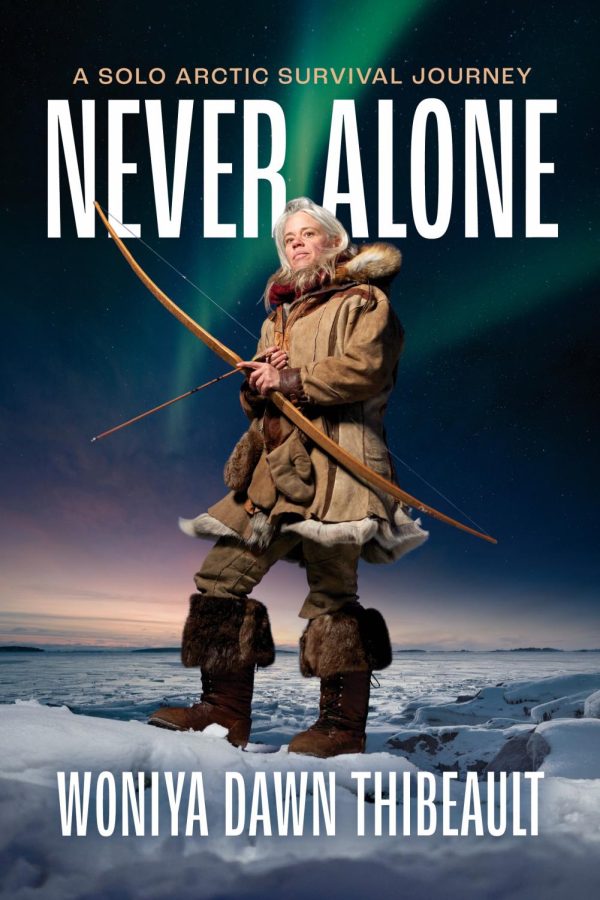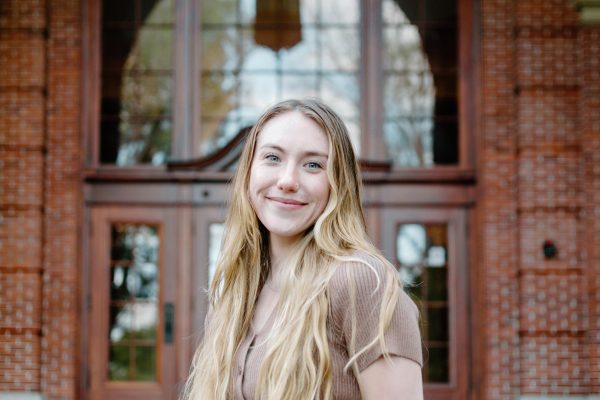Appreciation as survival, lessons shared from Woniya Thibeault
July 3, 2023
A marriage of science and appreciation for the natural world is what led Woniya Thibeault to become the first female winner of an extreme survival show. It was her approach to the experience that gave her a story to share.
Thibeault recounts her experience as a memoir centered around her second time on “Alone,” set on her arctic wilderness, in her book “Never Alone.”
“In our culture, we normally see all of these images of wilderness survival in the kind of Rambo out in the wilderness by himself with all the ammo strapped to his chest or the man versus wild type idea,” Thibeault said. “My approach was really, really different. It was with the idea that we come from nature, we belong in nature, it’s what we evolved for. It is part of who we are. And so it’s really more of a returning to rather than a departure from.”
This approach was a reflection of not only Thibeault embracing her connecting-and-loving ideals, but also an unknowing lifetime of preparation for an experience like this.
According to Thibeault, she had always felt like she was born in the wrong time due to her love of living off of the land and being one with nature. But it was not until she was a young woman that she was able to interact with people who felt the same.
This lifelong appreciation for nature led Thibeault to Oregon State University in 2001 where she earned a master’s of environmental science, working in plant ecology.
Thibeault credits her studies in plant ecology to recognize friend versus foe in the environment around her while on “Alone.”
“I could recognize the families (of plants), I could recognize the relationships. I was immersed in this brand new environment, but I had ways to understand it immediately because of that strong background in botany specifically, but also in all of the natural sciences,” Thibeault said.
While at OSU, Thibeault worked in biological control of invasive weeds, giving her field experience in monitoring the natural environment.
“It was neat to feel like I could have a hand in helping heal the natural world and some of the wrongs that humans have done to the natural world through my work at OSU,” Thibeault said.
According to Thibeault, she decided to go on “Alone” in the first place and then again a second time, because of the idea to put a lifetime of skill building to the test.
“I was really excited to apply the lessons I learned the first time and have another opportunity for this deep, deep immersion that I could just never get on my own,” Thibeault said. “I wouldn’t have access to those places, wouldn’t have the support team to pay for the helicopter to drop me in those places or monitor my health so that if things got rough… so going back again was kind of a no-brainer because my first time was so amazing.”
Thibeault went into “Alone” with thoughts that writing a book may come out of the experience. The confirmation came while she was living in the wilderness and saw the story as the fulfillment of a promise, one only she could tell.
“I had to hunt and trap if I wanted to survive, and so, being a force in the world for good relations with a natural world, being a representative of what is possible when we go to nature from a place of respect and reciprocity, and the idea to give back rather than just take, that’s what I was offering to that place in exchange for those lives that I had to take in order to live out there,” Thibeault said.
Thibeault began writing the book the same night she was pulled out of the wilderness environment.
“I was totally wakeful the entire night and I just grabbed the pad of paper and the pen in the desk in the hotel and started scribbling notes and I filled the entire little notepad of the hotel just within the first couple of hours of my time out,” Thibeault said. “So it’s been a long-term project, but I started it literally from the moment I came out of the wilderness.”
The book changed dramatically from that very first night on the hotel notepad to the version published today.
Thibeault said the process started with the need to write down everything which resulted in a 450,000 word account. At that point, it was less than half of the 73-day experience. This was when Thibeault noted that she learned the difference between writing and storytelling.
“I put the book aside because I felt so frustrated at recognizing that I’d gone about it all wrong,” Thibeault said. “Then I went onto a second ‘Alone’ challenge which I won, becoming the first woman to win ‘Alone’.”
Following her win, Thibeault recognized that this was the time to return to the story she began telling after her first experience, and share it with the world.
“The world’s gonna be paying attention and they’re gonna care about my story,” Thibeault said.
Now as a “readable book”, Thibeault hopes that readers learn something from her story and approach to the way we interact with nature.
Specifically for students, Thibeault hopes they take away the need to quantify the natural world and instead take a step back “to be able to feel the life beneath.”
“The connection and loving approach rather than the, you know, military based that you’re out there to battle approach, was really something missing and needed in the world,” Thibeault said.
For those looking to speak with Thibeault herself, she will return to her old stomping grounds in Corvallis this summer to host a book signing of this story at the Book Bin on July 12.
















































































































